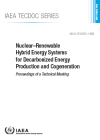Nuclear energy has the potential to increase worldwide energy and water security through non-electric applications, such as seawater desalination, hydrogen production, district heating and various industrial applications. The IAEA supports and facilitates the development of new and emerging applications of nuclear technologies.
Non-electric applications
Non-electric applications powered by nuclear energy could present sustainable solutions for a number of energy challenges current and future generations will have to face. There is growing interest around the world in using nuclear energy for such applications as seawater desalination, hydrogen production, district heating and various industrial applications.
Nuclear desalination has been demonstrated to be a viable option to meet the growing demand for potable water around the globe, providing hope to areas in arid and semi-arid zones that face acute water shortages. Nuclear desalination can also be used in the efficient water management of nuclear power plants, in particular in regions with water scarcity, to ensure a regular water supply is available for all phases of the construction, operation and maintenance of nuclear power plants.
Hydrogen, of which there are no natural deposits, plays a key role in many industrial applications. It is widely recognized as an environmentally friendly energy carrier and can be used as a clean fuel for transportation without contributing to global warming. Nuclear hydrogen production technologies show great potential and have a number of advantages over other sources that might be considered for a growing hydrogen share in a future world energy economy. Aside from lowering carbon taxes, electricity input to hydrogen production is decreasing with the higher temperatures offered by high temperature nuclear reactors. Additionally, generating electricity at such high temperatures is significantly more efficient, and thereby also more economical.
Industrial applications and nuclear cogeneration involve the integration of nuclear power plants with other systems and applications. Aside from its use for desalination and hydrogen production, the heat generated by nuclear power plants can be used to produce a vast range of other products, such as cooling, heating and process heat.
The IAEA supports and facilitates the development of new and emerging applications of nuclear technologies by co-generation and heat applications, including seawater desalination. It provides for the exchange of information on the various non-electric applications; publishes technical and economic documents; works with Member States in the context of coordinated research programmes; and organizes technical meetings on the topic. The Agency has developed a variety of software tools to give decision makers in the Member States information on the feasibility of non-electric applications using nuclear energy.








